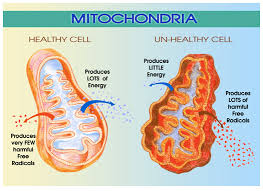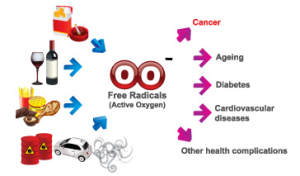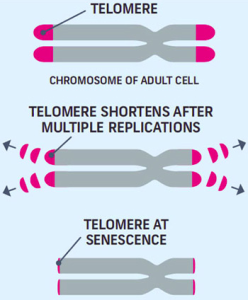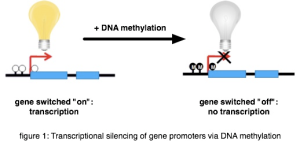Longevity Biomarkers
Longevity Biomarkers and “anti-aging”
These are 7 of the well-accepted biomarkers of longevity. Once identified these biomarkers can often be modified and improved. Optimizing these biomarkers can reduce risks of premature death and disability due to disease. It can lead to an immediate improvement in one’s quality of life,. It can also ideally promote a greater “healthspan” (the duration of one’s like that one is healthy) and lifespan.
1. Mitochondrial malfunction due to mutations, specific vitamin deficiencies, the effects of toxic metals, and poor communication to the cell’s DNA will accelerate aging. The mitochondria are the powerhouses of the cell. If their production of cellular energy is impaired the body will age more rapidly. Poorly functioning mitochondria are common in patients with fibromyalgia syndrome or fatigue and muscle aching. This can be assesses with a simple blood and urine test, often partially covered by PPO insurance.
2. Free radical damage to genes and proteins (“oxidative stress”). Free radicals form when atoms lose electrons and must steal replacement electrons from adjacent atoms. This leads to a breakdown of normal cell repair and cell membrane integrity and greatly increases risks for heart disease, stroke, cataracts, dementia and cancer. This can be assessed by blood testing.
3. Short “telomeres” which limit maximum number of cell divisions (and ultimately lifespan). Telomeres of the caps on the end of every DNA strand. They shorten with each cell division and are kept out to length by the enzyme telomerase. If the average telomeres are shortened and the shortest ones are too numerous, the cells and organs will have a shorter lifespan. Several blood tests are available to measure the average length telomere; One lab is able to also measure the shortest ones, which is more valuable to know than just the average length of the telomeres.
4. Senescent (aging) cells create a “dying cellular environment” due to abnormal cell-to-cell signaling.
5. A decline in one’s one stem cells will interfere with repair and regeneration of tissue in the body.
6. “Glycation” of proteins will age the body more rapidly. The outcome of glycation are called AGE’s (advanced glycemic end products). Glycation means adding a sugar molecule to another molecule, such as an amino acid or the blood pigment protein hemoglobin, rendering them useless. Glycation accelerates degenerative diseases including heart disease, Alzheimer’s and diabetes mellitus. Glycation also ages the skin. A Hemoglobin A1C (HbA1C), a common blood test that many doctors do only for their diabetic patients, but we do on ALL of our patients, is a good guide for the extent of glycation in the body. Ideally it should be < 5.7, although the low 5’s or less is healthier.
7. Epigenetic changes to DNA (epigenetics refers to the influence of the environment on one genetic (DNA, etc.) expression, especially on a process called methylation. Methylation means adding a CH3- group to a molecule. If your DNA is methylated it will prevent the cells from transcribing (manufacturing) proteins. Blood testing can check for methylation defects and other epigenetic changes.
Please see a list of some of the advanced tests used at BodyLogicMD of San Diego on the Advanced Testing page. At BodyLogicMD of San Diego testing can be done for many of these longevity biomarkers and a treatment plan can be started and then monitored for success. The goal is for you to live healthier and stay that way longer!





Follow Us
Like us on Facebook
Follow us on Twitter
Watch us on YouTube